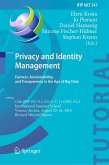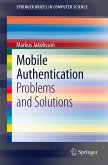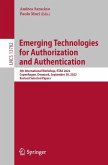This book begins with the theoretical background of cryptography and the foundations of authentication technologies and attack mechanisms. You will learn about the mechanisms that are available to protect computer networks, systems, applications, and general digital technologies.
Different methods of authentication are covered, including the most commonly used schemes in password protection: two-factor authentication and multi-factor authentication. You will learn how to securely store passwords to reduce the risk of compromise. Biometric authentication-a mechanism that has gained popularity over recent years-is covered, including its strengths and weaknesses.
Authentication and Access Control explains the types of errors that lead to vulnerabilities in authentication mechanisms. To avoid these mistakes, the book explains the essential principles for designing and implementing authentication schemes you can use in real-world situations. Current and future trends in authentication technologies are reviewed.
You will:
- Understand the basic principles of cryptography before digging into the details of authentication mechanisms
- Be familiar with the theories behind password generation and the different types of passwords, including graphical and grid-based passwords
- Be aware of the problems associated with the use of biometrics, especially with establishing a suitable level of biometric matching or the biometric threshold value
- Study examples of multi-factor authentication protocols and be clear on the principles
- Know how to establish authentication and how key establishment processes work together despite their differences
- Be well versed on the current standards for interoperability and compatibility
- Consider future authentication technologies to solve today's problems
Dieser Download kann aus rechtlichen Gründen nur mit Rechnungsadresse in A, B, BG, CY, CZ, D, DK, EW, E, FIN, F, GR, HR, H, IRL, I, LT, L, LR, M, NL, PL, P, R, S, SLO, SK ausgeliefert werden.









